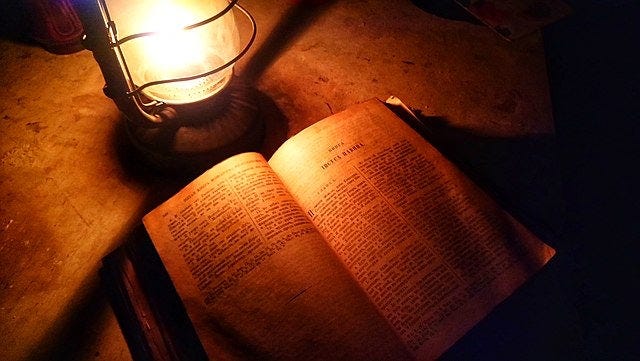Welcome to the Daily Bible Chapter. My name is James Leroy Wilson and I invite you to join me as I attempt to read the Bible with fresh eyes, as if I don't know anything about it. Let's see where this takes us!
I'm reading Young's Literal Translation (YLT) and the New Revised Standard Version (NRSV).
Leviticus 19
This is striking (quoting the NRSV):
5 “When you offer a sacrifice of well-being to the Lord, offer it in such a way that it is acceptable on your behalf. 6 It shall be eaten on the same day you offer it or on the next day, and anything left over until the third day shall be consumed in fire. 7 If any of it is eaten on the third day, it is an abomination; it will not be acceptable. 8 All who eat it shall be subject to punishment, because they have profaned what is holy to the Lord, and any such person shall be cut off from the people.
We found out in previous chapters that a "sacrifice of well-being" is more like a fellowship dinner. Perhaps the LORD didn't like people getting sick; would YOU eat meat that hasn't been refrigerated for two whole days?
After a few verses of emphasizing fair dealing, we get this:
19 “You shall keep my statutes. You shall not let your animals breed with a different kind; you shall not sow your field with two kinds of seed; nor shall you put on a garment made of two different materials.
It could be practical advice: don't do needless unproductive experiments. But I don't know what's wrong with a garment made of two different materials.
Verses 20:22 suggests that a slave-woman can't be held responsible for an affair with her master by the very fact that she's a slave. That's the practical problem with slavery; the master always bears responsiblity.
Verses 23-25 are weird. You can plant a fruit tree but not eat from it for another four years?
Verses 26-31 prohibits practices that might now be called magick. Rely on the LORD, not on earthly rituals or the wisdom of presumed psychics. In the "as without, so within" sense, there is only you and the spirit within. Letting other people or external conditions guide you is to be misdirected from your path.
The chapter is rounded out with more statements about justice. I think it's noteworthy that, unlike Lot's guests at Sodom, the sojourner can feel safe.
There's a segment of the population that is both anti-gay and anti-immigrant. For those who base their homophobia on Leviticus 18, it's a clever trick to throw Leviticus 19 in their face to promote the rights of the immigrant.
But as I emphasized yesterday, nothing the LORD proclaims in this story is God's command for us today. The LORD is hovering over the encampment in an odd cloud that a modern witness would report as a UFO. You're damn right the Isrealites "feared the LORD," we would, too. The manna, the events at Sinai, the fiery mishap that consumed two of Aaron's sons - these were the works of the LORD who was physically present or nearby. In a story.
The decree of such a frightening tyrant in a story shouldn't decide modern-day State policies toward the poor and immigrants, no more than it should settle matters of ssexuality.
What we can say is that, putting aside several peculiarities, these chapters show the LORD with a concern that the people stay in good health by taking care of what they eat and touch, and that they treat others with charity and justice. It's as if the LORD wants them to love themselves and to love their neighbors as themselves. It is in this sense that the LORD wants Israel to be "set apart" from the nearby nations.
James Leroy Wilson writes Daily Miracles, The Daily Bible Chapter, JL Cells, and The MVP Chase. Thanks for your subscriptions and support!
(Photo credit: TyshkunVictor)





No comments:
Post a Comment